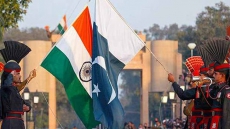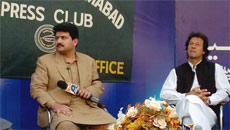WASHINGTON - A looming humanitarian catastrophe has pulled the United States deeper into the Iraq conflict, several years after American troops exited a long and painful war there.
President Barack Obama announced Thursday night that he had authorized airstrikes to protect members of an ancient religious minority group stranded on a mountain, facing starvation and the threat of mass execution.
Thousands of Yazidis now find themselves trapped by the al-Qaida splinter group known as the Islamic State of Iraq and the Levant. The president announced that a successful aerial drop of humanitarian supplies had already been completed, and airstrikes could follow.
"They're without food, they're without water, people are starving and children are dying of thirst," Obama said in a televised address from the White House.
"Meanwhile, ISIL forces below have called for the systematic destruction of the entire Yazidi people — which would constitute genocide. So these innocent families are faced with a horrible choice: descend the mountain and be slaughtered, or stay and die of thirst and hunger...
"Earlier this week, one Iraqi in the area cried to the world, 'There's no one coming to help.' Today, America is coming to help."
In his address, the president repeatedly sought to reassure a war-weary U.S. public that he has no intention of getting involved more deeply in the conflict, which has seen Islamist rebels gobble up territory and conduct mass killings.
Having won a Nobel Peace Prize a mere nine months into his presidency, Obama noted that he was elected on a promise to remove American troops from Iraq and he promised that he wouldn't conclude his time in office by sending them back in.
"There is no decision that I take more seriously than the use of military force," he said, reiterating a promise not to send in combat troops. "Over the last several years we have brought the vast majority of our troops home from Iraq and Afghanistan, and I have been careful to resist calls, time and again, to turn to our military."
He cited two reasons for the military authorization in this case: the opportunity to save Yazidi civilians, and the duty to protect U.S. diplomats working in a northern Iraqi area where the rebels were approaching.
The Canadian government also condemned ISIL's behaviour, which it described as "repugnant." Foreign Affairs Minister John Baird said "despicable acts of violence" had displaced more than 200,000 people in the past week, and were driven purely by hate and intolerance.
The sense of urgency was conveyed in a heart-rending scene in the Iraqi parliament this week.
The only lawmaker representing that minority, MP Vian Dakhil, broke down in tears as she described how 70 children had died during the siege, while hundreds of men had been executed and a number of women were killed or sold into slavery.
"We are being slaughtered. We are being exterminated. An entire religion is being wiped from the face of the Earth," she said, speaking through tears. "Brothers, I appeal to you in the name of humanity to save us."
News of a possible escalation came less than two months after Obama announced he was sending 300 military advisers to help the Iraqi military against ISIL. At the time, Obama said he was worried about mission creep and vowed that American combat troops, who left Iraq three years ago, would not return.

One military analyst said it's hard to imagine a humanitarian airdrop, with food and supplies, without military hardware backing it up.
"You're not going to have an airdrop unless you also have an airstrike — because you have to be able to secure the area," Col. Jack Jacobs told a panel on MSNBC. "Humanitarian aid, willy nilly, all over the countryside with the trapped people trying to find their way ... to go collect it all, just doesn't make any sense at all."
However, like everyone else who spoke on the panel, Jacobs warned that the long-term solution to the turmoil rippling through the Middle East would be a more coherent political and economic strategy for the region — not military strikes.
In an ominous coincidence of timing, Thursday's news came on the 50th anniversary of the start of escalated U.S. involvement in the Vietnam War — that deadliest of American foreign military quagmires.
On Aug. 7, 1964, both houses of Congress passed the Gulf of Tonkin resolution that gave then-president Lyndon Johnson authority to use all necessary means to protect U.S. troops and their allies in the region.
The Vietnam conflict also began with the U.S. sending in military advisors, followed by airstrikes and ultimately tens of thousands of casualties.
But there's a huge difference from that era, and even from the more recent Iraq invasion in 2003.
U.S. public opinion is now resolutely anti-war.
A Quinnipiac poll last month said a majority of Americans surveyed were opposed to sending ground troops back into Iraq, by a margin of 63 per cent to 29 per cent — with opposition coming from supporters of all political parties, genders and age groups.
A minuscule two per cent of respondents supported using piloted aircraft, while 20 per cent supported using drones or cruise missiles from a distance.
"No one — Obama, (or) the U.S. military — is thrilled about deepening involvement or optimistic about Iraq's government," said Stephen Saideman, the Paterson Chair in International Affairs at Ottawa's Carleton University.
"So, very much the opposite (from Vietnam)."






